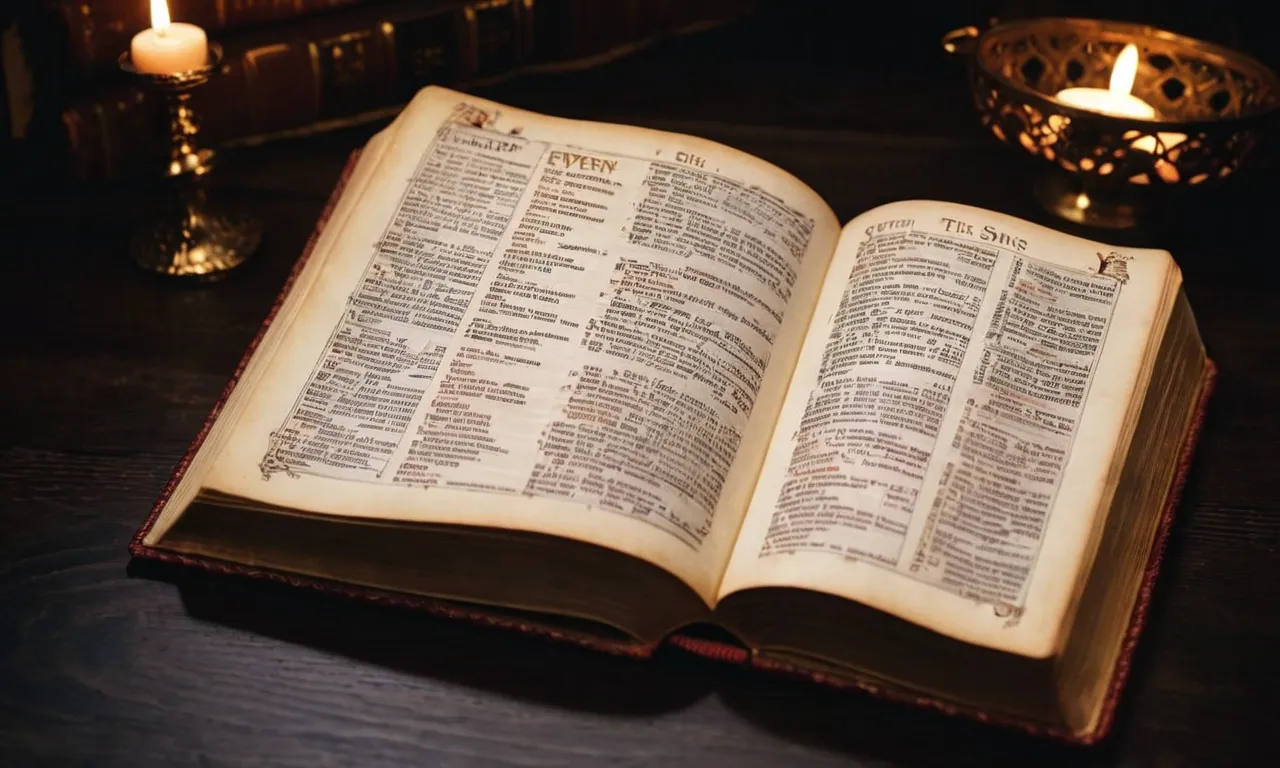What Are The Sins In The Bible?
The Bible mentions many behaviors that God considers sinful. But if you’re short on time, here’s a quick answer: the main sins in the Bible include idolatry, murder, theft, adultery, homosexuality, greed, slander, pride, folly, and more.
The Ten Commandments
Do Not Worship False Gods
The first commandment given to Moses by God was that the Israelites shall have no other gods before Him (Exodus 20:3). This commandment forms the basis of monotheism, the belief in one true God. Worshipping false idols like statues, animals, or earthly possessions instead of the one true God is strictly forbidden.
Adhering to this commandment ensures that God alone is worshipped and glorified.
Do Not Make Idols
The second commandment expands upon the first by prohibiting the Israelites from making idols or graven images to worship (Exodus 20:4-6). Fashioning gold, silver, stone, or wooden idols in the shape of created things like humans, animals, or earthly objects was a common practice among Israel’s neighboring pagan nations.
But God expressly forbids idolatry because He alone is God, and no created thing could ever compare to Him. Making and worshipping idols is an act of spiritual adultery.
Do Not Take God’s Name in Vain
The third commandment instructs the Israelites not to misuse God’s name or take it in vain (Exodus 20:7). God’s name represents His divine nature and authority. Using His name lightly, falsely, or as a curse word profanes and blasphemes His holy name.
This commandment teaches that God’s name should always be treated with reverence.
Remember the Sabbath
God commands His people to remember the Sabbath day by keeping it holy (Exodus 20:8-11). For the Israelites, the Sabbath was the seventh day of the week when they would cease from labor to focus on spiritual rejuvenation and worshipping God.
Honoring the Sabbath demonstrates trust in God’s provision and recognition that life is more than work. Keeping this commandment ensures time is made for what matters most.
Honor Your Father and Mother
The fifth commandment instructs the Israelites to honor their father and mother (Exodus 20:12). This commandment emphasizes the importance of family relationships and respecting parental authority. When children honor their parents, they also honor God’s divine order and experience blessings (Ephesians 6:2-3).
Disrespecting parents severs an essential human connection.
Do Not Murder
This sixth commandment forbids murder or intentionally taking the life of another human being unjustly (Exodus 20:13). God created life and has ordained its purpose and length. Murder steals that which only God can give and take away.
Upholding the sanctity of human life protects individuals and society at large.
Do Not Commit Adultery
God commands His people not to commit adultery (Exodus 20:14). Adultery is having sexual relations outside of marriage. It corrupts marriage and family relationships. This commandment promotes sexual purity and faithfulness between husband and wife.
Keeping marital vows and remaining chaste safeguards against sexual sin.
Do Not Steal
The eighth commandment prohibits stealing or taking anything that rightfully belongs to another (Exodus 20:15). This includes kidnapping, burglary, and dishonest business practices. Respecting personal property ensures a just society. Contentment counteracts the covetousness that motivates stealing.
Do Not Bear False Witness
God instructs His followers not to bear false witness or lie about others (Exodus 20:16). False accusations, slander, and perjury all fall under this prohibition. Truth and honesty are foundational to all healthy relationships and community. Lying does incredible damage.
Do Not Covet
The tenth and final commandment forbids covetousness or desiring things that belong to others (Exodus 20:17). Coveting causes jealousy, greed, theft, and fraud. This commandment promotes selflessness and contentment. When the Israelites obeyed God’s law, they enjoyed peace, prosperity, and freedom.
Sins Against God
Idolatry
Idolatry is the worship of idols, images, or anything created instead of the one true God. This sin is explicitly forbidden in the Ten Commandments: “You shall have no other gods before me. You shall not make for yourself a carved image, or any likeness of anything that is in heaven above, or that is in the earth beneath, or that is in the water under the earth.
You shall not bow down to them or serve them” (Exodus 20:3-5). Idolatry denies God’s supreme authority and dignity by replacing Him with false gods and graven images. Through the Old Testament prophets, God frequently rebuked His people for turning to worthless idols rather than worshipping Him alone.
In the modern world, idolatry can take more subtle forms as well. Our jobs, money, relationships, or possessions can become idols if we value them over God. Social media, entertainment, and technology can also become idols if they distract us from loving and serving God.
At its root, idolatry is elevating anything in our lives to the place of supremacy that rightfully belongs only to God. He alone is worthy of our worship and wholehearted devotion.
Blasphemy
Blasphemy involves speaking irreverently or disrespectfully about God. Examples include attributing evil characteristics or flaws to God, denying His power, and questioning His love, wisdom, or justice.
One form of blasphemy is taking the Lord’s name in vain, either by swearing falsely or lightly using the name of God, Jesus Christ, or the Holy Spirit as an exclamation or curse word (Exodus 20:7). Blasphemy also includes speaking slanderously about God’s character or works.
In the Bible, blasphemy was considered a very serious offense. In Leviticus 24:16, God commanded that those who blasphemed the Lord’s name be stoned to death. The Pharisees accused Jesus of blasphemy when He claimed authority to forgive sins and equated Himself with God (Luke 5:21).
However, Jesus was declaring the truth about His divine identity and affirming His authority to forgive. True blasphemy is speaking falsely about God’s character or slandering His holy name.
Desecration of Holy Things
Desecration refers to treating something sacred with contempt, irreverence, or disrespect. In the Old Testament, things associated with worship that were “set apart” or made holy included the altar, the tabernacle and temple, the ark of the covenant, and the vessels used in the sacrifices.
Treating any of these sacred items in a profane manner was punishable by death (Leviticus 10:1-3). Even touching Mount Sinai, the mountain where God’s presence descended, was forbidden while God’s presence was there (Exodus 19:12-13).
While we may not have physical temples or sacred altars today, God still calls His people to revere holy things. We are to treat worship, prayer, and communion with utmost respect. The name of the Lord is to be honored.
Desecration can include flippantly using the name of God, handling the Bible carelessly, or participating irreverently in Christian rituals. God is majestic, glorious, and holy. He deserves our deepest awe and reverence.
Sins Against Others
Murder
Murder is considered one of the most heinous sins in the Bible. It is expressly forbidden in the Ten Commandments: “You shall not murder” (Exodus 20:13). Murder is the intentional, unjustified killing of another human being.
It destroys a person created in God’s image and often leaves devastating emotional wounds for the victim’s loved ones. Though murder is an attack on humanity itself, the Bible emphasizes God’s grace and forgiveness for repentant murderers like David and the Apostle Paul.
Theft
Theft is condemned throughout Scripture as a sin against one’s neighbor. The Ten Commandments forbid stealing, and passages like Ephesians 4:28 instruct believers to work honestly so they can share with the needy.
Though often considered a minor infraction today, the Bible takes theft seriously as it violates others’ property that God has entrusted to them. Restitution and apologies are necessary for repentant thieves to make things right.
Adultery
Adultery, or having sexual relations outside of marriage, is declared sinful in Exodus 20:14 and other Bible passages. It destroys trust between spouses and often deeply hurts children. Adultery frequently stemmed from lust, greed, or dissatisfaction.
Though devastating to relationships, adultery is forgivable. Many prominent Bible figures like David committed adultery but later repented.
Slander
Slander involves making false, damaging statements about others. Verses like Proverbs 11:13 and 1 Peter 2:1 warn against gossip and false accusations that ruin reputations. Slander spreads vicious rumors and destroys relationships. It frequently stems from jealousy, hatred, or insecurity.
Left unchecked, slander can divide families, friends, churches, and even nations. As with other sins, God forgives those who repent of slander.
Oppression
The Bible denounces oppressing others, especially the poor and vulnerable. Verses like Zechariah 7:10 and James 5:4 condemn cheating workers and perverting justice through bribery. Though often motivated by greed, oppression can also stem from prejudice and feelings of superiority.
It treats people as mere means to gain power or material wealth. God holds oppressors accountable and cares deeply for the oppressed. He calls His followers to “loose the chains of injustice and set the oppressed free” (Isaiah 58:6).
Sins of Character
Pride
Pride is considered one of the most serious sins in the Bible. It is characterized by an inflated sense of one’s status and importance. Bible verses that discuss pride include Proverbs 16:18 (“Pride goes before destruction, and a haughty spirit before a fall.”)
and James 4:6 (“God opposes the proud, but gives grace to the humble.”) Statistics show that narcissism and self-centeredness are rising in modern society, indicating that pride continues to be a relevant issue.
Greed
Greed refers to an excessive desire for or pursuit of money, wealth, food, or other possessions, beyond what one needs or deserves. Several Bible passages decry greed, such as Hebrews 13:5 (“Keep your lives free from the love of money and be content with what you have”) and Luke 12:15 (“Watch out!
Be on your guard against all kinds of greed.”) Surveys indicate that materialism is increasing globally, suggesting that greed remains a common sin.
Gluttony
Gluttony involves overindulgence and overconsumption, especially of food or drink. Biblical texts that mention gluttony include Proverbs 23:21 (“For the drunkard and the glutton will come to poverty”) and Philippians 3:19 (referring to people whose god is their stomach).
Research shows that obesity rates continue to climb globally. This could reflect widespread issues with gluttony and overeating.
Lust
Lust denotes intense sexual desire and gratification without love, commitment or self-control. Passages referring to lust include 2 Timothy 2:22 (“Flee from youthful lusts”) and Matthew 5:28 (“Everyone who looks at a woman with lustful intent has already committed adultery with her in his heart.”)
Though societal views on sexuality have shifted over time, lust remains one of the seven deadly sins, indicating lust’s seriousness per the Bible.
Wrath
Wrath involves extreme anger, rage, or indignation. Bible verses that discuss wrath include James 1:20 (“The anger of man does not produce the righteousness of God”) and Proverbs 15:1 (“A gentle answer turns away wrath, but a harsh word stirs up anger.”)
Anger and conflict seem ubiquitous today through politics, road rage incidents, online comments, and more. Hence wrath remains a highly relevant sin.
Envy
Envy means resentful longing aroused by another’s possessions or qualities. Scriptural texts that describe envy include Galatians 5:26 (“Let us not become conceited, provoking one another, envying one another”) and Proverbs 14:30 (“Envy rots the bones.”)
Social media usage has been linked with rising rates of depression and anxiety, often centering on social comparison. This suggests envy persists as a modern sin.
Sloth
Sloth refers to excessive laziness, indolence, or apathy towards important matters. The Bible associates sloth with wickedness, as seen in Proverbs 19:15 (“Laziness casts one into a deep sleep, and an idle soul suffers hunger.”)
Statistics indicate rising rates of inadequate physical activity globally, implying that sloth remains problematic.
Conclusion
In summary, the Bible contains many examples of sins that displease God and harm others. From the Ten Commandments to the seven deadly sins, Scripture gives clear warnings about idolatry, sexual immorality, selfishness, injustice and other evils to avoid.








